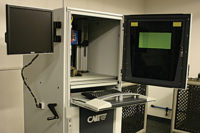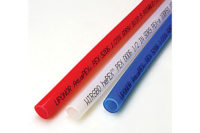Like every niche assembly process, manufacturing cables for industrial equipment presents numerous challenges. One of the most common is being able to consistently print clear markings on each cable.
Australian-based Bambach Wires & Cables has dealt with this problem for decades while serving its automotive, marine, defense, sound-and-lighting, rail, power-and-transmission and irrigation customers. Bambach cables come in various colors, diameters (1 to 30 millimeters) and plastic substrates (PVC, polyurethane and XLPE).
Michael Ng, operations manager at Bambach, says that although the cables move quickly along production lines, each marking needs to be clearly printed with black or white ink. The markings are located at varying intervals, and may contain short number codes that are just a few centimeters apart, or long alphanumeric messages with significant-distance spacing. Types of printed information include product identification, pack size, company branding, customer logos, standards compliance and factory numbers for traceability.
In 2013, the company’s older printers, which were located next to the extrusion line, started to perform unreliably. Coding errors often appeared on cable as it was extruded, resulting in frequent downtime, decreased production and poor end-product quality. Making matters worse, staff limitations prevented consistent rework, leading to costly material waste.
To overcome these problems, Bambach looked into using ink-jet printers. After comparing equipment and technology from different suppliers, Bambach purchased three Linx 7900 units made by Linx Printing Technologies Ltd. Linx distributor Matthews Australasia Pty Ltd. installed the printers, which run eight to 10 hours per day, five days per week, at speeds of up to 200 meters per minute.
Ng says that the company is most impressed with the printers’ excellent print quality, ability to keep up with high line speeds, flexibility to print on the full range of cable diameters and ease of use. Equally important, the printers’ simple setup lets Bambach workers change over lines quickly for more uptime. Plus, they have eliminated rework and product waste, resulting in large savings.
Introduced in July 2012, the Linx 7900 features state-of-the-art ink-dispensing technology that enables it to run for up to 9,000 hours or 18 months between maintenance. Its Insight software lets an operator remotely connect to the Internet on a PC or Smartphone to monitor the printer while the production line is running—or start, stop or pause the printer as needed.
The operator can also remotely download messages from a PC to the printer and edit messages from pre-stored selections to reduce coding errors. To further limit errors, a user can lock the printer keyboard to prevent changes being made on the production line.
Established in 1936, Bambach is an AS/NZS ISO 9001:2008 certified company that produces a wide range of industrial cables. Specialty types include low- and medium-voltage, high-temperature, flexible earths, braids and terminated braids. Customized options range from halogen-free materials and a paper-covered conductor, to multiple core sizes and litz wire, which can consist of hundreds of fine strands of insulated magnet wire.
For more information on ink-jet printers, call 636-300-2000 or visit www.linxglobal.com/en-gb/.





